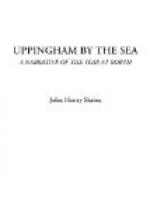If the accommodation during school hours was adequate, it was less easy to find elbow-room for the boys at other times. It was well enough from May to August under the ample roof of blue summer weather; but in the rainy season (and at Borth, as elsewhere, that winter was a wet one) we should have been sorely cramped but for relief afforded by the “studies” noticed in a previous chapter. It is time we should describe them. Studies they were not, in the sense in which the word is understood at Uppingham, where a school law declares that “a boy’s study is his castle,” and confers upon him what Aristotle calls the “unspeakable” delight of the “sense of private property.” At Borth this could not be. In very rare cases was a room the one and indivisible belonging of a single owner; often as many as six shared the table and fireplace. Some of these tenements had at least the less solid merit of looking picturesque. Peeping into a Welsh interior, with its stone kitchen-floor, polished wainscoting, and oak furniture, its walls hung with German prints of imaginative battle-pieces and Nonconforming worthies, and its kitchen-dresser with ranks of ancestral crockery, vivid in light and colour, which catches the eyes first of all things through the open door, “This,” one was tempted to cry, “were the study for me! Here would I sit in the shelter of the wooden screen which keeps away draughts and noisy company, and turn the pages of my Livy for the tale of Cincinnatus, and deeds of rustic heroes; or hear old Horace descant on the gracious simplicity of life among the Sabines.”
The boys thought quite otherwise. The kitchen was generally the last room to be chosen. Perhaps the idyllic attractions did not balance the drawback of living in the thoroughfare of the house. Nor could one fail to sympathise with those who preferred the garret, a poor thing but their own, in which two studious souls could hob-nob, or even the austere whitewash, narrow skylight, and niggard dimensions of some monastic cell, which held just the one student, his table, and his books. The editor of the School Magazine, writing a month after our arrival, finds it “a queer new feeling to do the old work in a strange place, to miss the accustomed pictures on the walls, the accustomed column of books rising on either hand—even the familiar table-cloth and carpet, and to sit instead inside the framework of a six-foot bed, with roof and walls forming the queerest possible combinations of lines and angles, and hung with three different patterns of paper.” To woo the muses in a garret is the common fate of genius; but most of the “students” (for so their landladies, misled by a name, called the occupants of a study) were better off than this literary gentleman. When fires came to be lighted in the winter, there was a cheerful domesticity in the sight of the red coals, which is unknown to the solitude of Uppingham studies, with their hot-water pipe that warms but not exhilarates. In particular, one cheery well-furnished parlour, where a blazing hearth threw its light over the well-worn bindings of a select library brought with us from the Sixth-Form-room, and on the well-contented faces of its two custodians, burns as a bright spot in our memory of those winter days.




